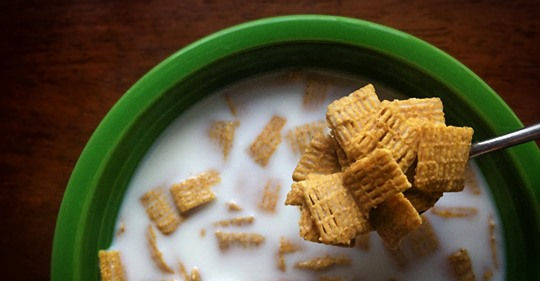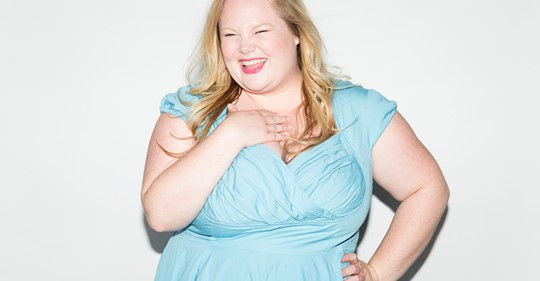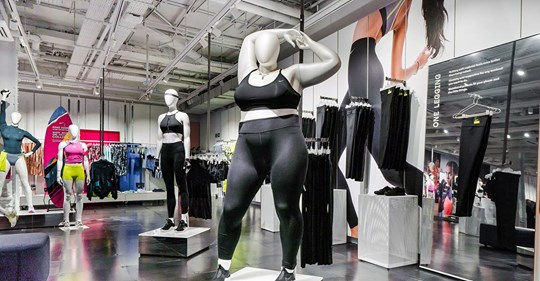HealthNotDiets Digest, Issue 24, 2019
- Fiona Willer
- Jun 24, 2019
- 6 min read
June 14 - June 20, 2019
As always, if you like what you read here, please support the original author by liking/sharing/following/up-voting/subscribing directly to their feed.
Happy reading!
Articles & Blogs

My fat body is my own business
by Stephanie Yeboah
"We understand research has had negative impacts on community in the past, so we want to change that power imbalance. We want to have community direct the things that we do”

Aboriginal health issues more than just skin deep
by Helen Pitt
"I think there’s a feistiness that drives my patient care and work in Indigenous health more broadly – I want to fight for the vulnerable, the people who deserve better than what they’ve got so far"

RoundUp Isn’t Poisoning Your Cheerios
by Gid M-K
“Fortunately for everyone who likes breakfast, the truth is a bit less scary...Cheerios probably aren’t giving you cancer after all.”

Fashion Is Ignoring Plus-Size Men, So These Models Are Paving Their Own Way
by Evan Ross Katz
"That ability to openly love oneself, while a pillar of the body positivity movement writ large, remains a lesser spoken about factor for men, body positive or otherwise, due in large part to the pervasiveness of toxic masculinity, which masquerades the idea of loving oneself as soft in a world where men must be tough.”

When You’re Told You’re Too Fat to Get Pregnant
by Virginia Sole-Smith
"there is no B.M.I. cut-point above which it is absolutely unsafe to have a pregnancy...and weight loss does not ensure a safer pregnancy”

No, poor NZ families don’t just need to make ‘better choices’
by Rebekah Graham
“There is a fundamental contradiction between the societal dictate that “beggars can’t be choosers” and nutritional advice that people in hardship simply need to “make better food choices”. Food insecurity is a far-reaching social issue that is not reducible to notions of individual choice. Indeed, blaming individuals for not growing their own vegetables or for making “poor choices” on limited means merely perpetuates the shame and stigma associated with food scarcity."

Reversing “Obesity”
Before & After, Testimonials, and Mass Weight Loss
by Jon Robison
"there is nothing wrong with testimonials – people saying how they feel about a program. But if the promised outcome is permanent weight loss – testimonials at the end of an intervention don’t tell you anything about that outcome. No getting around it. The plural of anecdote is not science!”

Don’t Yuck My Yum: Kids Books That Dismantle Orientalism & Food Shaming
by Books For Littles
“Find children’s books that dismantle racist food shaming against American Asian & Pacific Islanders.”

Eating disorders can mask autism in girls
by Caitlin Fitzsimmons
"Some researchers believe autism and anorexia share an underlying genetic vulnerability. Another theory is that missed or delayed diagnosis of autism in girls could leave them vulnerable to developing secondary mental health problems, including anorexia.”
https://www.theage.com.au/lifestyle/health-and-wellness/eating-disorders-can-mask-autism-in-girls...

How Social Rejection Causes Stress and Inflammation
by Amee Severson
“The obsession with inflammation and dietary changes often misses the very preventable cause of inflammation and disease-stress, which can result from obvious and universal, yet underestimated, moments like social rejection.”

One in seven adults have 'suicidal thoughts' about body image
by The Gazette
"The poll....part of a report “Body Image: How we think and feel about our bodies”....also found that just over on third of all adults said they have felt anxious because of their body image.”

The mindfulness conspiracy
by Roland Purser
“teachers of mindfulness need to acknowledge that personal stress also has societal causes. By failing to address collective suffering, and systemic change that might remove it, they rob mindfulness of its real revolutionary potential, reducing it to something banal that keeps people focused on themselves.”

What Medicine Can Learn From Doctors And Researchers With Disabilities
by Susie Neilson
“The exclusion of people with disabilities from the biomedical workforce undermines the goal of achieving true diversity and is a missed opportunity for science and medicine"

Study Finds Hundreds of Medical Procedures To Be Ineffective
by Jessica Baron
“Once a treatment becomes widespread, it’s difficult to get people – physicians included – to abandon it.”

‘Bread is practically sacred’: how the taste of home sustained my refugee parents
by Aleksandar Hemon
“The exclusion of people with disabilities from the biomedical workforce undermines the goal of achieving true diversity and is a missed opportunity for science and medicine"

What Does Intuitive Eating Even Mean?
by Katie Heaney
“Intuitive eating is an ongoing process, and many people have absorbed so many food rules and restrictions that they’ll never really be “done” unlearning them"

Fat Girls Take The Lead
by Jen Ponton
“The more exposure we have to diverse bodies in entertainment, the more we’ll be able to look in the mirror and see that same potential in ourselves."
Research & Clinical Practice
Slim Chance for Permanent Weight Loss
by Esther D. Rothblum
“Since the 1950s, health and mental health professionals have criticized the conventional wisdom that people can lose weight and keep it off. Weight loss programs have high dropout rates and rarely have participants move from “clinical” to “normal” weights, and the overwhelming majority of people who lose even 5–10% of body weight have regained it 1 year later. The present article reviews some challenges in the weight loss research and provides some possible reasons why psychologists continue to uphold the conventional wisdom that permanent weight loss is possible."
Sharing again because it's an excellent article.
Rothblum, E. D. (2018). Slim chance for permanent weight loss. Archives of Scientific Psychology, 6(1), 63-69.
Soapbox & Shareables

I was interviewed on ABC Drive Perth (radio) about the reaction to those Nike mannequins.
You can listen here:
My bit starts at 1:37:40 :-)

A reminder to any woman who looks at her body and finds it flawed: except for #11 (which is a modern sculpture), the figures below are prehistoric carvings of goddesses. These represent the epitome of feminine beauty to those we seek to emulate when we go on “paleo” diets. Not a flat tummy, thigh gap, or gravity-defying breast among them.
These are bodies that are unique to their owners, and contain stories of desire, creation, hardship, and perseverance. These are bodies that are ready to hold you as you cry. These are bodies that worked every day to provide nourishment, resources and guidance to their communities while also caring for the next generation. They supported one another in their labor, holding one another’s babies while they worked crafting tools, collecting water & singing songs to teach the young about the goddesses they so closely resembled.
And these carvings weren’t found in just one area. They’ve been discovered nearly everywhere humanity has settled and thrived. Which means there was a time when womanhood, in all her power and capacity, was revered not as merely a sexual novelty or shunned as sinful temptation, but seen as a source of inspiration to create, to connect, and to find courage.
Today, our patriarchal society reveres conformity in women over all. It demands that women strive to achieve and maintain a form that resembles an untested girl. Our bodies must look perpetually untouched, unspoiled, a blank slate for a man to claim and use and write his own story upon. Instead of worshiping women as they are, we scrutinize and discard them as never good enough. And the more we strive to conform, the more we give up control of our bodies.
So have comfort, women: with each fat roll and jiggle you gain as you move forward in time, you come closer to resembling the goddess as she originally appeared in the hearts of humanity. She lives in you and longs to be seen and revered as she was before.
And you deserve to be worshipped.
Unpacking Weight Science Podcast
How about bite-sized podcasts that you can claim as professional development?!?
I've designed the Unpacking Weight Science Podcast to suit health professionals, health science students and anyone who wants to know more about human body weight, health outcomes, interpreting weight related research and the far ranging effects of weight bias.
The 20-30 minute monthly podcasts unpack different elements of weight bias & stigma, weight research, BMI, health behaviours and weight neutral approaches. Paid subscribers (only $5/month!) get instant access to all the previous episodes plus for the most recent episodes, full show notes, reference list, self-test quiz and resource materials for use in practice. This equates to an hour of professional development activity each month :-)
Available for subscribers now is:
'Starving in the Intensive Care Unit'
Ep 24: People of all sizes end up in intensive care, with their life hanging in the balance. Without modern medicine they’d be dead already. Despite this cutting edge of science setting, larger patients are often arbitrarily underfed. This episode discusses why this is, what the implications for larger patients are, and what we can do about it.
Subscribe now at: https://www.patreon.com/UnpackingWeightScience
and instantly access 18 episodes before the rest of the world!
Episodes 1-5 are now on iTunes!
Search 'Unpacking Weight Science'
to listen to them for free!

Training Opportunities in 2019
FACE-TO-FACE
Fremantle, Western Australia, 26-27 June
Auckland, New Zealand, 7-8 October
Melbourne, Victoria, 12-13 October
Newcastle, New South Wales, 21-22 November
ALL DISCIPLINES WELCOME
Perth, Western Australia, 28 June
Auckland, New Zealand, 9 October
Melbourne, Victoria, 11 October
Newcastle, New South Wales, 23 November
ONLINE (SELF-PACED)
Want these 'live'? Then follow me on Twitter (@FionaWiller), Facebook (@HealthNotDiets) and Instagram (@FionaWiller)
Want more info about the non-diet approach or unpacking weight science? Resources include books, courses, workshops and handouts: visit www.healthnotdiets.com
See anything you think I'd like to share or comment about? Post in the comments below or email me at fiona@healthnotdiets.com











Comments